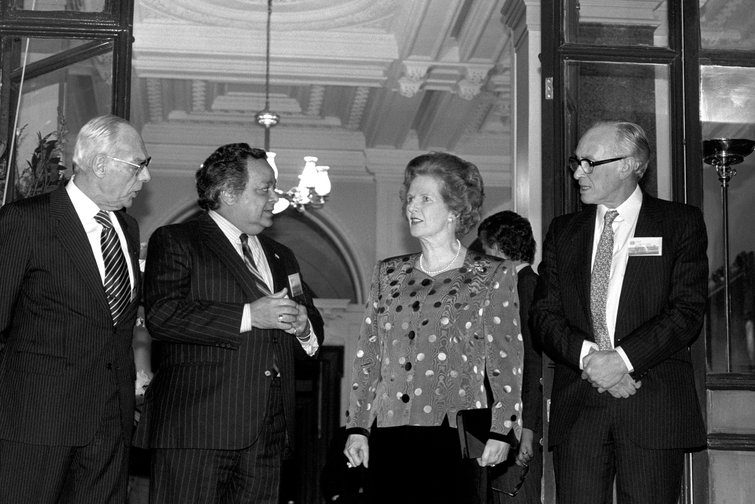
Thatcher had a battle plan for her economic revolution – now the left needs one too
The Ridley Plan was a masterclass in strategising for transformative economic change. What would a left equivalent look like today?

This essay is part of ourEconomy's 'Preparing for the next crisis' series.
In 1977, Tory backbencher Nicholas Ridley presented Margaret Thatcher with a report unglamorously titled 'Final Report of the Nationalised Industries Policy Group' – later to become known as the ‘Ridley Plan’.
Ridley, the son of a wealthy family whose coal and steel interests had been nationalised under the Attlee government, was implacably opposed to public ownership. And beneath its innocuous title, the Ridley Plan amounted to an astonishingly ruthless and hard-headed battle plan for privatisation – one which was to guide the Thatcherites’ assault on the nationalised industries, and whose repercussions are still with us today.
The Ridley Plan prefigures almost all of the key moments in the long neoliberal assault on public ownership, from the open war against the miners to the privatisation “by stealth” (Ridley’s own words) of the NHS. It suggests that Thatcher pick her battles, provoking confrontations in “non-vulnerable industry, where we can win” such as the railways and the civil service, while taking steps to create the conditions for eventual victory against the more powerful trade unions. It outlines a plan to prepare the ground for privatisation by introducing market measures in the running of nationalised industries (such as changes of leadership, targets for return on capital, and new incentives for managers), and fragmenting the public sector into independent units that could later be sold off.
Ridley explicitly describes this as a “long term strategy of fragmentation”, “a cautious ‘salami’ approach - one thin slice at a time, but by the end the whole lot has still gone”. In a controversial appendix entitled ‘Countering the Political Threat’, leaked to the Economist in 1978, he even anticipated the pitched battles of the miners’ strike, highlighting the need for “a large, mobile squad of police who are equipped and prepared to uphold the law” against violent picketing.
Lessons for the left
The Ridley Plan should be required reading for anyone who wants to understand how we got to where we are today. But what does it have to do with a series on preparing for the next financial crisis? As it turns out, everything. For one thing, as Joe Guinan and I argue in our book People Get Ready!, it is a masterclass in strategising for transformative economic change, identifying the practical steps needed to unravel a dominant system and replace it with something new. The questions it confronts – where the Thatcherites were strong and where they were weak; where they should pick battles and where they should proceed more cautiously; how to erode the power of their opponents to the point where they could win – are exactly the questions the left needs to answer today if it is serious about changing the system.
What happens during a crisis may depend, as Milton Friedman put it, on “the ideas that are lying around”. But it would be naïve to think that ideas are enough. In the teeth of powerful and entrenched interests, we also need strategies for shifting power so that these ideas can become reality.
And here the relevance of the Ridley Report is even more direct. The task facing the left today is almost exactly analogous to the one Ridley was set in 1977. As Grace Blakeley has argued, we must take on the banks in the same way that Thatcher took on the unions. If we ask ourselves where power lies in today’s economy, the City of London is the obvious answer. And if we ask ourselves what is the system that needs to be dismantled, our current form of highly financialised capitalism is the obvious answer.
As Ben Wray argues in his recent piece for this series, our generation’s challenge is to break down this power and transition our economy to one where capital is democratically owned and put to work for the benefit of all. And, as Thatcher herself observed, “there is no point in embarking on a battle unless you are reasonably confident you can win”. Ridley’s observation that the “state monopoly industrial unions … [had] the nation by the jugular vein” could equally well apply to the City today.
Just like him, we need more than a policy platform for a new system. We also need a strategy for taking on the extractive financial institutions that will stand in the way – one which slowly erodes their power over time whilst also preparing for a decisive confrontation when conditions are right.
A Ridley Plan for the City?
After the 2008 crisis, as Laurie Macfarlane notes in his series introduction, a once-in-a-generation opportunity for all-out confrontation with the City was missed. The failure of the system was exposed for all to see, the political armour of high finance seriously weakened. But the moment passed without a strong movement pushing for real alternatives that would have truly curbed its power. The system regrouped, the most radical proposals for change were successfully seen off, and the power of extractive finance reasserted itself.
Banks like RBS were bailed out with no strings attached and no meaningful public control, with the ultimate aim of sending them back to the private sector. Full separation of retail and investment banking was rejected in favour of a softer ‘ringfence’. Capital requirements were increased, but not nearly as much as many argued was necessary. After a few years, the same toxic financial products that helped cause the crisis were allowed to proliferate again.
In all these areas, lobbyists from the big commercial banks were able to mould the detail of new regulations so that it caused minimum disruption to their business models.
Levelling down the City
A fresh financial crisis might create the conditions where a radical government would have the political capital and public support to confront the City more directly. One task is therefore to flesh out the technical detail of such a programme so that it is ready to hit ‘go’ when this moment arrives. We must learn the lesson of the post-2008 period, where public debate fixated on symbolic gestures such as curbing bankers’ bonuses, jailing bosses and revoking peerages – superficial measures which did not get to the root of the power relations and toxic business models that make the City so dangerous. It is crucial that a radical administration is in a position to immediately seize the initiative and push through the hard-hitting measures that would trigger deeper change.
Today’s financial system is complicated – cynics might say that it is complicated by design. Certainly, bank lobbyists are expert at using this complexity to their advantage. We can see this in the fate of the Vickers reforms, where a straightforward separation of retail and investment banking was rejected in favour of a ringfence that required reams of complicated regulation to put into practice. As the public gaze moved on, bank lobbyists waged a slow war of attrition against the spirit of the reforms, opening gaping loopholes which allowed banks to cross-lend and cross-subsidise between their retail and investment arms.
Similarly, the byzantine complexity of capital requirements has allowed big banks to manipulate the amount of capital they must hold against different types of assets, maintaining their most profitable lines of business whilst locking out smaller social-purpose banks who lack the resources to navigate this complexity. And of course, banks have been only too happy to point to the resulting regulatory spaghetti as evidence that they are now over-regulated, that the post-crisis response has gone ‘too far’, that reforms must be allowed to ‘bed in’ before any further changes are proposed.
After the next crisis, we must not fall victim to this dynamic. The impetus for reform must not become bogged down in endless consultations and negotiations: radical politicians and the movement behind them must know exactly what we want, and crucially how it can be put into practice, before the crisis hits. We must prepare not only headline measures but the technical detail that sits behind them to ensure they can be implemented. This must include steps to break up the big banks, ban or restrict their most dangerous activities (for instance, banning derivatives trading by those without an insurable interest in the underlying assets), and force them to hold significantly more capital – as well as plans to transition any financial institutions requiring bail-outs into true democratic ownership, and to enhance public control of credit creation.
Since many of the relevant regulations are international (such as the Basel Accords), we must also build coalitions with progressive forces in other countries and have a plan for how a post-Brexit UK can be a positive player on the international stage. Finally, aware that the City’s power may still lead the political response to gravitate towards a compromise position, we need to be persistently bold and radical to continually drag the centre of gravity back again. As Ben Wray argues, crisis conditions could open the door to measures that would be inconceivable in normal times, such as full nationalisation (or remutualisation) of the banking sector, debt write-offs or capital controls. But sustaining the momentum for change in the face of opposition will not be easy, and will require powerful coalitions to be built and sustained.
Levelling up the alternatives
But preparing crisis responses is not the only task, nor do we have to sit around waiting for a crisis to hit before starting the real work of systems change. Indeed, the key lesson of Ridley is that to do so would be a huge mistake. As the Thatcherites saw in the 1970s, the real prize is not simply to regulate existing institutions to make them behave more as we would like, but to replace them with new institutions where this behaviour is wired in. For Ridley, this meant transitioning the nationalised industries into private ownership. For us, it means transitioning the financial system into democratic ownership.
Regulatory measures should therefore be seen not as the main goal but as part of a wider strategy to limit the City’s most damaging activities and cut its power down to size, whilst transitioning failing institutions into new forms of ownership. Conversely, ‘levelling up’ new, more democratic forms of finance is essential groundwork for any future confrontation with the City to succeed. Like it or not, decades of demutualisations, mergers and takeovers have left our financial system dangerously over-dependent on a few big banks. We have also promoted the City as our main export sector, sacrificing other industries and the communities that depended on them in the process. Indeed, this is precisely why the 2008 financial crisis hit the UK comparatively harder than many other developed economies. When the big banks withdrew their lending, there was simply very little else to step into the breach. This means that, however poor a job the City does of supporting the real economy, taking it on without building up alternative sources of finance in advance would cause significant economic and social disruption and could risk deepening a downturn.
The second key task for those seeking to prepare for the next crisis is therefore to build up the new institutions and sectors that can replace the City’s vital social functions, leaving us free to take on its speculative activities without major unintended consequences. Most other developed economies have a significantly larger ‘stakeholder banking’ sector – institutions owned and run for the public benefit rather than for private profit, from Germany’s co-operative banks and public savings banks (Sparkassen) to the Swiss cantonal banks. There is good evidence that such banks cushioned the impact of the 2008 crisis in these countries, maintaining lending to households and small businesses while big banks’ lending froze. If we can begin to rebuild the UK’s stakeholder banking sector and position it to play a similar role in the event of a future crisis, we could simultaneously cushion the economic impact of a crash, expand our room for manoeuvre in confronting the City, and permanently tip the system towards democratic ownership and control.
This won’t be easy in a highly uncompetitive market where the big players have such entrenched positions, so we will need to make use of our existing assets. This is one key benefit of Labour’s proposals to create a National Investment Bank and Regional Development Banks with a remit to support sustainable and productive lending, and a Post Bank making use of the Post Office’s existing branch network to provide access to key retail banking services in every community. Taken together and implemented carefully, these new institutions could significantly reduce our dependence on large commercial banks within a relatively short timeframe.
RBS is another key asset that must be used strategically: we must not forget that one of the UK’s largest retail banks is still in majority public ownership, albeit without meaningful public control. Unless we fight to keep it there, it will most likely be reprivatized to prevent a future radical government from getting its hands on it and turning it into a genuine public interest bank. We cannot afford to let this happen, and must build a much stronger force of popular opposition to a future Conservative firesale of RBS.
At the same time, we must support nascent attempts to revive the co-operative banking sector, such as South West Mutual and others acting under the umbrella of the Co-operative Savings Bank Association. All the evidence shows that if we want a system that can thrive in both good times and bad, the aim must not be to replace a private oligopoly with a public monopoly, but to build a diverse ecosystem of public and co-operative finance institutions. Steps to achieve this could include local authorities acting as first-mover investors; in-kind support and capacity building programmes offered by the National Investment Bank; and mandating regulators to specifically support and incubate democratic finance (for example, through a Diversity Hub housed in the Financial Conduct Authority or by reviewing the Prudential Regulation Authority’s enforcement of capital requirements, as proposed by the Finance Innovation Lab).
The best interventions will be those that simultaneously level down the power of the City and level up the power of democratic finance. A key task is to ensure that new banks such as the Post Bank and new co-operative banks grow predominantly by taking market share away from the existing big commercial banks rather than each other. As Laurie Macfarlane and I suggested in our report to the Labour Party, we may be able to build on existing regulatory interventions such as the ‘incentivised transfer scheme’ imposed on RBS under competition regulation as a condition of its state bail-out. This essentially requires RBS to give its customers incentives to switch to its competitors, as well as providing development funding for challenger banks. A case could be made for extending such requirements to all major commercial banks to reflect the implicit taxpayer subsidy they receive by being ‘too big to fail’, and tailoring requirements to specifically promote new stakeholder banks (at present, the lion’s share of support is being swallowed up by commercial challengers such as Metro Bank).
Conclusion
The City of London is one of the most powerful engines for the extraction of wealth the world has ever seen. Its tentacles are wrapped around almost every facet of our lives, and it continues to exert a powerful hold over our politics. A serious strategy for definancialising our economy will of course require action on all these fronts as well. As Beth Stratford has previously argued for openDemocracy in relation to housing, and as I have argued in relation to pensions, disentangling high finance from ordinary people’s livelihoods is an essential part of a radical policy agenda. And as Ben Wray points out in his contribution to this series, tackling the corporate capture and institutional inertia of the British state will be an essential precondition for the strategies outlined above to work.
Of course, all this is a monumental task. But if we want to halt our escalating crises of planetary breakdown and soaring inequality, it is one we cannot avoid. Much as he would have hated the idea, it is time for the British left to step up to the plate and become the true heirs of Nicholas Ridley.
Read more
Get our weekly email




Comments
We encourage anyone to comment, please consult the oD commenting guidelines if you have any questions.